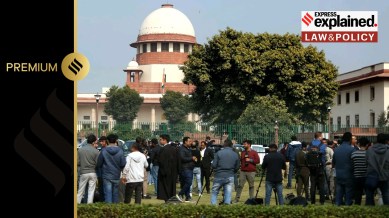Electoral Bonds: How SC struck down amendments in three key laws, restored status quo restricting political donations
To prepare the ground for the Electoral Bonds Scheme, The Finance Act, 2017 changed provisions of India's election law, the Companies Act, and the Income-tax law. What did the Govt do, and what has the SC said now?

Along with the Electoral Bonds Scheme (EBS), the Supreme Court on Thursday (February 15) struck down several amendments that the government made in key laws to facilitate corporate donations to political parties.
The amendments were made through The Finance Act, 2016, and The Finance Act, 2017, before the EBS was introduced in January 2018.
monthly limit of free stories.
with an Express account.
Before the two Finance Acts were passed, political parties were required to declare all contributions more than Rs 20,000 with no exceptions, and to maintain a record of all donations more than Rs 20,000 for purposes of taxation. Also, there was a cap on the amount of money that a company could donate to a political party in a financial year: companies could contribute a maximum of 7.5% of their average net profits from the preceding three years.
The Finance Act, 2017 amended The Representation of the People Act, 1951 (RPA), The Income-tax Act, 1961, and The Companies Act, 2013. The amendments allowed electoral bonds to cut through many of the restrictions on political party funding by completely doing away with the donation limit for companies, and removing the requirements to declare and maintain a record of donations through electoral bonds.
Thursday’s judgment by the Supreme Court has restored the status quo that existed before the Finance Act, 2017 was passed, in all of these statutes. This is what the relevant provisions of these laws say.
The Representation of the People Act, 1951
Section 29C of the Act requires political parties to prepare a report detailing the donations received by them in a financial year. Parties are required to declare all contributions higher than Rs 20,000 in this report, and specify whether they were received from individual persons or from companies.
WHAT FINANCE ACT, 2017 DID: The Finance Act, 2017, amended the RP Act to include an exception to Section 29C. It said that the requirement to declare all donations in excess of Rs 20,000 would not apply to donations received through Electoral Bonds.
WHAT THE SC SAID: The Supreme Court struck down the amendment, and observed that the original requirement to disclose contributions of more than Rs 20,000 did an effective job of balancing voters’ right to information with the right to privacy of donors, as donations below this threshold were far less likely to influence political decisions.
The Companies Act, 2013
A number of changes were made to Section 182 of the Act, which details the prohibitions and restrictions a company must abide by when giving political contributions.
Prior to the amendment, Section 182(1) placed a cap on the amount of money a company could donate in a single financial year, limiting it to 7.5% of the company’s average net profits during the previous three financial years.
Section 182(3) required a company to disclose any amount contributed to any political party along with the particulars of the amount donated and the name of the receiving party.
WHAT FINANCE ACT, 2017 DID: This section was amended to remove the cap on the amount of money a company could donate to a political party. Also, only the total amount contributed had to be disclosed — and the company would no longer be required to declare which political party it had sent a donation to, nor the specific amount.
WHAT THE SC SAID: The court struck down this amendment. Chief Justice of India (CJI) D Y Chandrachud observed that “permitting unlimited corporate contributions authorises unrestrained influence of companies in the electoral process”.
The court held that this violated the right to free and fair elections, and restored the original provision which is meant to curb corruption in electoral financing.
The Income-tax Act, 1961
Section 13A(b) of The Income-tax Act says that a political party shall not include voluntary contributions as part of its total income, but it is required to maintain a record of all contributions received that are above Rs 20,000. This record must include the name and address of the person who has made the donation.
WHAT FINANCE ACT, 2017 DID: The Act amended this section to include the words “other than contribution by way of Electoral Bond”.
Also, a new Section 13A(d) was added, which required that all donations exceeding Rs 2,000 must be given through certain methods, which included Electoral Bonds.
WHAT THE SC SAID: The court held that exempting political parties from maintaining a record of donations received through Electoral Bonds would violate the right to information of voters under Article 19(1)(a) of the Constitution.
The court struck down both the amendment to Section 13A(b), and the new Section 13A(d).